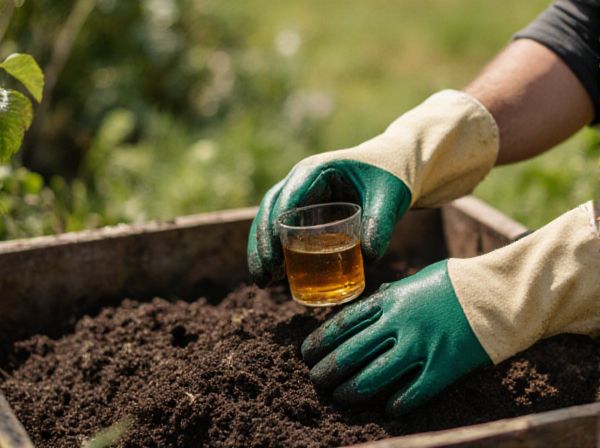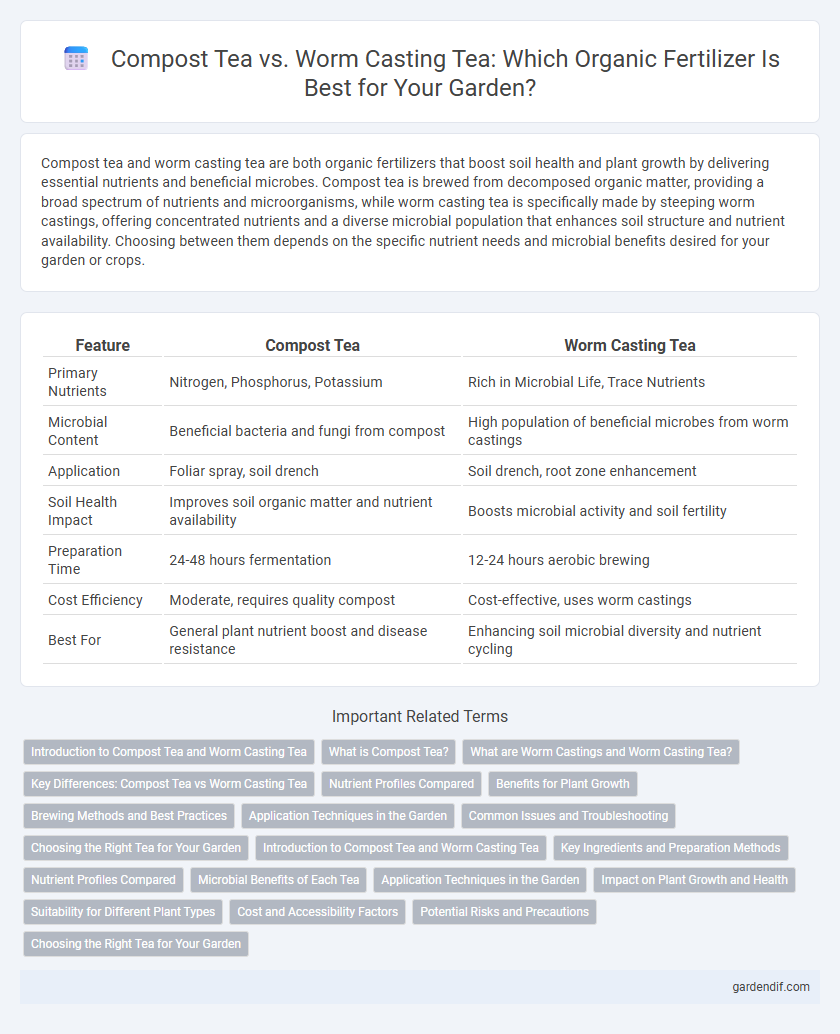
Compost tea vs worm casting tea Illustration
Compost tea and worm casting tea are both organic fertilizers that boost soil health and plant growth by delivering essential nutrients and beneficial microbes. Compost tea is brewed from decomposed organic matter, providing a broad spectrum of nutrients and microorganisms, while worm casting tea is specifically made by steeping worm castings, offering concentrated nutrients and a diverse microbial population that enhances soil structure and nutrient availability. Choosing between them depends on the specific nutrient needs and microbial benefits desired for your garden or crops.
Table of Comparison
| Feature | Compost Tea | Worm Casting Tea |
|---|---|---|
| Primary Nutrients | Nitrogen, Phosphorus, Potassium | Rich in Microbial Life, Trace Nutrients |
| Microbial Content | Beneficial bacteria and fungi from compost | High population of beneficial microbes from worm castings |
| Application | Foliar spray, soil drench | Soil drench, root zone enhancement |
| Soil Health Impact | Improves soil organic matter and nutrient availability | Boosts microbial activity and soil fertility |
| Preparation Time | 24-48 hours fermentation | 12-24 hours aerobic brewing |
| Cost Efficiency | Moderate, requires quality compost | Cost-effective, uses worm castings |
| Best For | General plant nutrient boost and disease resistance | Enhancing soil microbial diversity and nutrient cycling |
Introduction to Compost Tea and Worm Casting Tea
Compost tea and worm casting tea are nutrient-rich organic fertilizers used to enhance soil health and plant growth. Compost tea is brewed from compost, extracting beneficial microbes and nutrients into a liquid form that promotes soil microbial activity. Worm casting tea, made by steeping worm castings in water, delivers essential micronutrients and bioavailable minerals while supporting beneficial microbial populations.
What is Compost Tea?
Compost tea is a nutrient-rich liquid fertilizer made by steeping compost in water to extract beneficial microorganisms and soluble nutrients. It enhances soil health by introducing diverse microbial populations that aid in nutrient cycling and disease suppression. Compared to worm casting tea, compost tea typically contains a broader spectrum of organic matter and microbial diversity, promoting plant growth and resilience.
What are Worm Castings and Worm Casting Tea?
Worm castings are nutrient-rich organic matter produced by earthworms as they digest organic material, containing beneficial microbes and essential nutrients for plant growth. Worm casting tea is a liquid fertilizer made by steeping worm castings in water to extract microbial life and soluble nutrients, enhancing soil fertility and plant health. This tea acts as a natural bio-stimulant, promoting microbial diversity and improving nutrient uptake compared to traditional compost teas.
Key Differences: Compost Tea vs Worm Casting Tea
Compost tea is a nutrient-rich liquid extracted by steeping compost in water, containing a diverse microbial population that enhances soil fertility and plant health. Worm casting tea, derived from soaking worm castings in water, is particularly high in beneficial microorganisms and plant growth hormones such as auxins, leading to improved nutrient uptake and root development. The key difference lies in their microbial diversity and nutrient profiles, with compost tea offering broader microbial benefits while worm casting tea delivers more concentrated bioactive compounds.
Nutrient Profiles Compared
Compost tea contains a broad spectrum of nutrients including nitrogen, phosphorus, potassium, and trace minerals, promoting balanced plant growth. Worm casting tea is richer in beneficial microbes and enzymes, with higher concentrations of nitrogen and humic acids that enhance soil health and nutrient uptake. Both teas improve soil fertility, but worm casting tea generally offers a more bioactive nutrient profile that accelerates microbial activity and nutrient availability.
Benefits for Plant Growth
Compost tea and worm casting tea both enhance plant growth by improving nutrient availability and stimulating beneficial microbial activity in the soil. Compost tea provides a broad spectrum of microorganisms that enhance nutrient uptake and disease resistance, while worm casting tea is rich in humic acids and enzymes that promote root development and increase soil aeration. Using either tea boosts plant vigor and yield, but worm casting tea often delivers more concentrated nutrients for rapid growth responses.
Brewing Methods and Best Practices
Compost tea and worm casting tea require precise brewing methods to maximize nutrient extraction and microbial activity; compost tea benefits from aeration using an air pump for 24-48 hours, while worm casting tea often involves soaking castings in water for 24-72 hours with occasional stirring. Maintaining optimal temperatures between 65-75degF and adding ingredients like molasses enhances the growth of beneficial microorganisms in both teas. Using clean, dechlorinated water and monitoring pH levels around 6.5-7 ensures the highest quality brew, promoting effective soil enrichment and plant health.
Application Techniques in the Garden
Compost tea is typically applied as a foliar spray or soil drench to rapidly deliver nutrients and beneficial microbes directly to plants and root zones, enhancing nutrient uptake and disease resistance. Worm casting tea, rich in humic acids and beneficial enzymes, is often used as a targeted soil amendment to improve soil structure and microbial activity when applied around plant bases. Both application techniques promote healthier plant growth but differ in their nutrient delivery methods and microbial focus for garden use.
Common Issues and Troubleshooting
Compost tea and worm casting tea often face issues like foul odors due to anaerobic conditions and uneven nutrient distribution caused by improper aeration during brewing. Troubleshooting involves maintaining adequate oxygen levels through regular stirring or using aerators, monitoring brewing time to prevent over-fermentation, and ensuring the use of clean, contaminant-free water to promote beneficial microbial growth. Proper temperature control between 65-75degF optimizes microbial activity and reduces the risk of harmful pathogens in both teas.
Choosing the Right Tea for Your Garden
Compost tea contains diverse microbial populations essential for soil health, while worm casting tea is rich in nutrients like nitrogen, phosphorus, and potassium. Selecting the right tea depends on your garden's specific needs; compost tea enhances microbial activity for disease suppression, whereas worm casting tea promotes nutrient availability and plant growth. For optimal results, test soil conditions and tailor tea applications to address nutrient deficiencies or microbial imbalances effectively.
Compost tea vs worm casting tea Infographic

 gardendif.com
gardendif.com